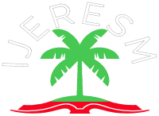International Journal of Emerging Research in Engineering, Science, and Management
Vol. 4, Issue 3, pp. 29-34, Jul-Sep 2025.
https://doi.org/10.58482/ijeresm.v4i3.5
This work is licensed under a Creative Commons Attribution 4.0 International License.
Re-Envisioning Talent Management in the 5th Industrial Revolution: A Conceptual Framework Integrating Systems and Design Thinking
Kumar Aditendra Nath Shah Deo
Anu Priya
Department of Commerce and Management, Ranchi University, Ranchi, Jharkhand, India.
Abstract: The 5th Industrial Revolution (5IR) is reshaping the global business landscape by integrating artificial intelligence, robotics, and the Internet of Things with a renewed focus on human-centered innovation. Talent management (TM), traditionally regarded as a human resources function, must re-envision itself within this paradigm. This paper develops a conceptual framework that applies systems thinking and design thinking to talent management in the context of the 5IR, enabling organizations to remain agile, innovative, and resilient. Systems thinking offers a holistic perspective on understanding the interconnections within the talent ecosystem, while design thinking promotes creative, empathetic, and human-centered solutions. Drawing on recent research on coopetition in SMEs, project-based talent development, global talent practices, and digital readiness in the public sector, the framework highlights the importance of upskilling, leadership support, and the responsible adoption of AI. The outcomes suggest that organizations should adopt holistic and adaptive talent management practices to address skills gaps, foster innovation, and maintain a competitive advantage in the rapidly evolving global environment.
Keywords: 5th Industrial Revolution, Design Thinking, Human-Centered Innovation, Systems Thinking, Talent Management.
References:
- N. Mandloi, “Talent Management: A Strategic Approach towards Growth in IT Industry,” samvad.sibmpune.edu.in, 2015, doi: 10.53739/samvad/2015/v8/98301.
- S. Jooss, J. Lenz, and R. Burbach, “Beyond competing for talent: an integrative framework for coopetition in talent management in SMEs,” International Journal of Contemporary Hospitality Management, vol. 35, no. 8, pp. 2691–2707, Jul. 2022, doi: 10.1108/ijchm-04-2022-0419.
- M. Pancewicz, “Project management as a component of talent management programmes,” Journal of Management and Financial Sciences, no. 48, Feb. 2024, doi: 10.33119/jmfs.2023.48.3.
- E. Crawley, S. Swailes, and D. Walsh, “Global talent management,” in Oxford University Press eBooks, 2013. doi: 10.1093/hebz/9780199563210.003.0013.
- E. Shava and S. V. Doorgapersad, “Talent management: A ‘recipe’ for public service delivery in the fourth industrial revolution,” International Journal of Research in Business and Social Science, vol. 10, no. 8, pp. 138–148, Jan. 2022, doi: 10.20525/ijrbs.v10i8.1504.
- R. Luna, “Talent Management Strategy and mindset,” in Advances in logistics, operations, and management science book series, 2024, pp. 31–44. doi: 10.4018/979-8-3693-3057-9.ch003.
- A. S. Kidwai, “Talent management and the role of talent manager,” NHRD Network Journal, vol. 18, no. 1, pp. 48–50, Jan. 2025, doi: 10.1177/26314541251325696.
- A. Aljbour, E. French, and M. Ali, “The Many Faces of Talent Management: Organizational perspectives on talent and talent management practices in Jordan,” Human Resource Development Quarterly, Mar. 2025, doi: 10.1002/hrdq.21562.
- Mindtools, “McKinsey and Co: the War for Talent,” Jun. 19, 2025. https://www.mindtools.com/au93a5l/mckinsey-and-co-the-war-for-talent#google_vignette
- D. G. Collings and K. Mellahi, “Strategic talent management: A review and research agenda,” Human Resource Management Review, vol. 19, no. 4, pp. 304–313, May 2009, doi: 10.1016/j.hrmr.2009.04.001.
- “Ackoff Center Weblog: Systems Theory (Russell Ackoff).” https://ackoffcenter.blogs.com/ackoff_center_weblog/2019/04/systems-theory-russell-ackoff.html
- Tim Brown, Change by Design: How Design Thinking Transforms Organizations and Inspires Innovation. Harper Collins, 29 Sept 2009.
- C. Ashton and L. Morton, “Managing talent for competitive advantage: Taking a systemic approach to talent management,” Strategic HR Review, vol. 4, no. 5, pp. 28–31, Jul. 2005, doi: 10.1108/14754390580000819.
- J. Bhatnagar, “Talent management strategy of employee engagement in Indian ITES employees: key to retention,” Employee Relations, vol. 29, no. 6, pp. 640–663, Oct. 2007, doi: 10.1108/01425450710826122.
- N. Steenhuis, “AIHR’s 2023 wrapped: Continuously striving for excellence,” AIHR, Oct. 24, 2024. https://www.aihr.com/blog/2023-at-aihr/
- J. Kim-Schmid and R. Raveendhran, “Where AI Can — and Can’t — Help Talent Management,” Oct. 13, 2022. https://hbr.org/2022/10/where-ai-can-and-cant-help-talent-management.
© 2025 The Author(s). Published by IJERESM. This work is licensed under the Creative Commons Attribution 4.0 International License.
Archiving: All articles are permanently archived in Zenodo IJERESM Community.
